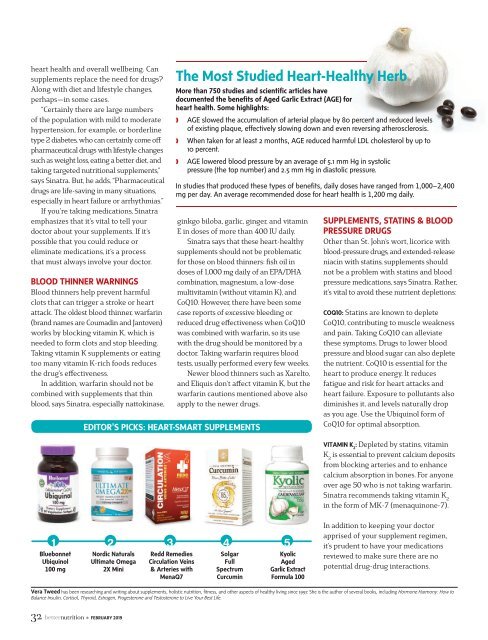You also want an ePaper? Increase the reach of your titles
YUMPU automatically turns print PDFs into web optimized ePapers that Google loves.
heart health and overall wellbeing. Can<br />
supplements replace the need for drugs?<br />
Along with diet and lifestyle changes,<br />
perhaps—in some cases.<br />
“Certainly there are large numbers<br />
of the population with mild to moderate<br />
hypertension, for example, or borderline<br />
type 2 diabetes, who can certainly come off<br />
pharmaceutical drugs with lifestyle changes<br />
such as weight loss, eating a better diet, and<br />
taking targeted nutritional supplements,”<br />
says Sinatra. But, he adds, “Pharmaceutical<br />
drugs are life-saving in many situations,<br />
especially in heart failure or arrhythmias.”<br />
If you’re taking medications, Sinatra<br />
emphasizes that it’s vital to tell your<br />
doctor about your supplements. If it’s<br />
possible that you could reduce or<br />
eliminate medications, it’s a process<br />
that must always involve your doctor.<br />
BLOOD THINNER WARNINGS<br />
Blood thinners help prevent harmful<br />
clots that can trigger a stroke or heart<br />
attack. The oldest blood thinner, warfarin<br />
(brand names are Coumadin and Jantoven)<br />
works by blocking vitamin K, which is<br />
needed to form clots and stop bleeding.<br />
Taking vitamin K supplements or eating<br />
too many vitamin K-rich foods reduces<br />
the drug’s effectiveness.<br />
In addition, warfarin should not be<br />
combined with supplements that thin<br />
blood, says Sinatra, especially nattokinase,<br />
The Most Studied Heart-Healthy Herb<br />
More than 750 studies and scientific articles have<br />
documented the benefits of Aged Garlic Extract (AGE) for<br />
heart health. Some highlights:<br />
<br />
<br />
<br />
AGE slowed the accumulation of arterial plaque by 80 percent and reduced levels<br />
of existing plaque, effectively slowing down and even reversing atherosclerosis.<br />
When taken for at least 2 months, AGE reduced harmful LDL cholesterol by up to<br />
10 percent.<br />
AGE lowered blood pressure by an average of 5.1 mm Hg in systolic<br />
pressure (the top number) and 2.5 mm Hg in diastolic pressure.<br />
ginkgo biloba, garlic, ginger, and vitamin<br />
E in doses of more than 400 IU daily.<br />
Sinatra says that these heart-healthy<br />
supplements should not be problematic<br />
for those on blood thinners: fish oil in<br />
doses of 1,000 mg daily of an EPA/DHA<br />
combination, magnesium, a low-dose<br />
multivitamin (without vitamin K), and<br />
CoQ10. However, there have been some<br />
case reports of excessive bleeding or<br />
reduced drug effectiveness when CoQ10<br />
was combined with warfarin, so its use<br />
with the drug should be monitored by a<br />
doctor. Taking warfarin requires blood<br />
tests, usually performed every few weeks.<br />
Newer blood thinners such as Xarelto,<br />
and Eliquis don’t affect vitamin K, but the<br />
warfarin cautions mentioned above also<br />
apply to the newer drugs.<br />
EDITOR'S PICKS: HEART-SMART SUPPLEMENTS<br />
In studies that produced these types of benefits, daily doses have ranged from 1,000–2,400<br />
mg per day. An average recommended dose for heart health is 1,200 mg daily.<br />
SUPPLEMENTS, STATINS & BLOOD<br />
PRESSURE DRUGS<br />
Other than St. John’s wort, licorice with<br />
blood-pressure drugs, and extended-release<br />
niacin with statins, supplements should<br />
not be a problem with statins and blood<br />
pressure medications, says Sinatra. Rather,<br />
it’s vital to avoid these nutrient depletions:<br />
COQ10: Statins are known to deplete<br />
CoQ10, contributing to muscle weakness<br />
and pain. Taking CoQ10 can alleviate<br />
these symptoms. Drugs to lower blood<br />
pressure and blood sugar can also deplete<br />
the nutrient. CoQ10 is essential for the<br />
heart to produce energy. It reduces<br />
fatigue and risk for heart attacks and<br />
heart failure. Exposure to pollutants also<br />
diminishes it, and levels naturally drop<br />
as you age. Use the Ubiquinol form of<br />
CoQ10 for optimal absorption.<br />
VITAMIN K 2<br />
: Depleted by statins, vitamin<br />
K 2<br />
is essential to prevent calcium deposits<br />
from blocking arteries and to enhance<br />
calcium absorption in bones. For anyone<br />
over age 50 who is not taking warfarin,<br />
Sinatra recommends taking vitamin K 2<br />
in the form of MK-7 (menaquinone-7).<br />
Bluebonnet<br />
Ubiquinol<br />
100 mg<br />
Nordic Naturals<br />
Ultimate Omega<br />
2X Mini<br />
Redd Remedies<br />
Circulation Veins<br />
& Arteries with<br />
MenaQ7<br />
Solgar<br />
Full<br />
Spectrum<br />
Curcumin<br />
Kyolic<br />
Aged<br />
Garlic Extract<br />
Formula 100<br />
In addition to keeping your doctor<br />
apprised of your supplement regimen,<br />
it’s prudent to have your medications<br />
reviewed to make sure there are no<br />
potential drug-drug interactions.<br />
Vera Tweed has been researching and writing about supplements, holistic nutrition, fitness, and other aspects of healthy living since 1997. She is the author of several books, including Hormone Harmony: How to<br />
Balance Insulin, Cortisol, Thyroid, Estrogen, Progesterone and Testosterone to Live Your Best Life.<br />
32 • FEBRUARY <strong>2019</strong>

















